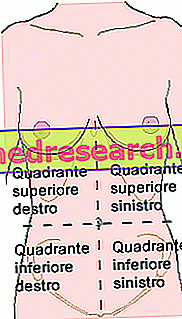Related articles: Febrile convulsions
Definition
Febrile convulsions are generalized seizures, which can occur when the body temperature rises rapidly above 38 ° C, in healthy children under the age of 6 years. This event occurs in the absence of previous brain damage or other neurologically identifiable causes.
Frequently, convulsions occur during the initial rapid rise in body temperature and many crises develop within 24 hours of the onset of fever. Most of these episodes occur at the age of 6-36 months.
Febrile convulsions occur during bacterial or viral infections, such as otitis, measles, rubella, sixth disease and meningitis. The exact triggering mechanism is still not known, but a genetic and family predisposition has been demonstrated.
In some cases, seizures occur as a side effect after the administration of certain vaccines, such as those against measles, mumps and rubella.
Characteristically, convulsions are generalized; most of these are clonic (with shaking of the arms and legs), but some can occur with a tonic posture (state of stiffening) or atonic (relaxation of the muscles).
Concomitant symptoms may include faeces and urine loss, gaze fixation or eye rotation. Common to all convulsions is the loss of consciousness, generally followed by a phase of drowsiness (post-critical period), which represents a return to normality.
Febrile convulsions can be:
- Simple : they are short-lived (no more than 15 minutes), do not repeat in 24 hours (if they occur in series, the total duration is less than 30 minutes) and do not have focal features; they occur in about 90% of cases and affect 2-5% of healthy children, between 6 months and 5 years of life. Sometimes the fever is not present at the time of the convulsion, but appears shortly after the end of the crisis.
- Complex : complex febrile convulsions last more than 15 minutes, have focal features or post-critical paresis or can occur in series with a total duration of more than 30 minutes.
As a rule, febrile convulsions do not cause neurological suffering and permanent damage, being short-lived. Furthermore, in children who have had simple febrile seizures, the risk of epilepsy is only slightly higher than in the general population.
Possible Causes * of Febrile Convulsions
- Meningitis
- Measles
- Ear infection
- Mumps
- Rubella
- Sixth disease



